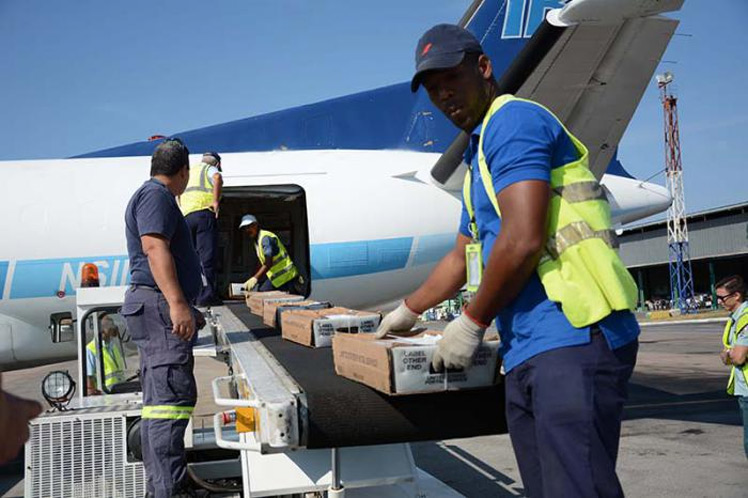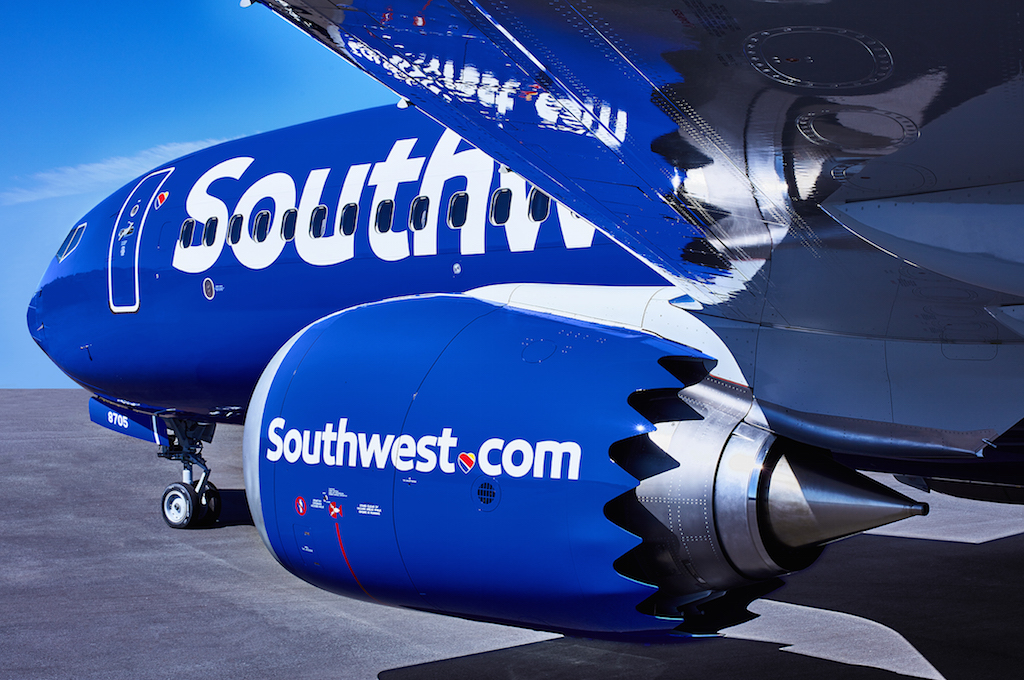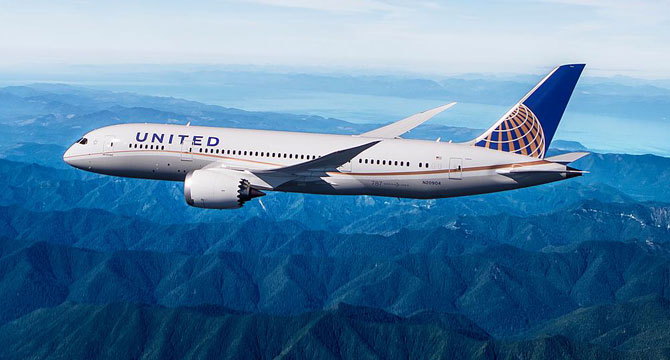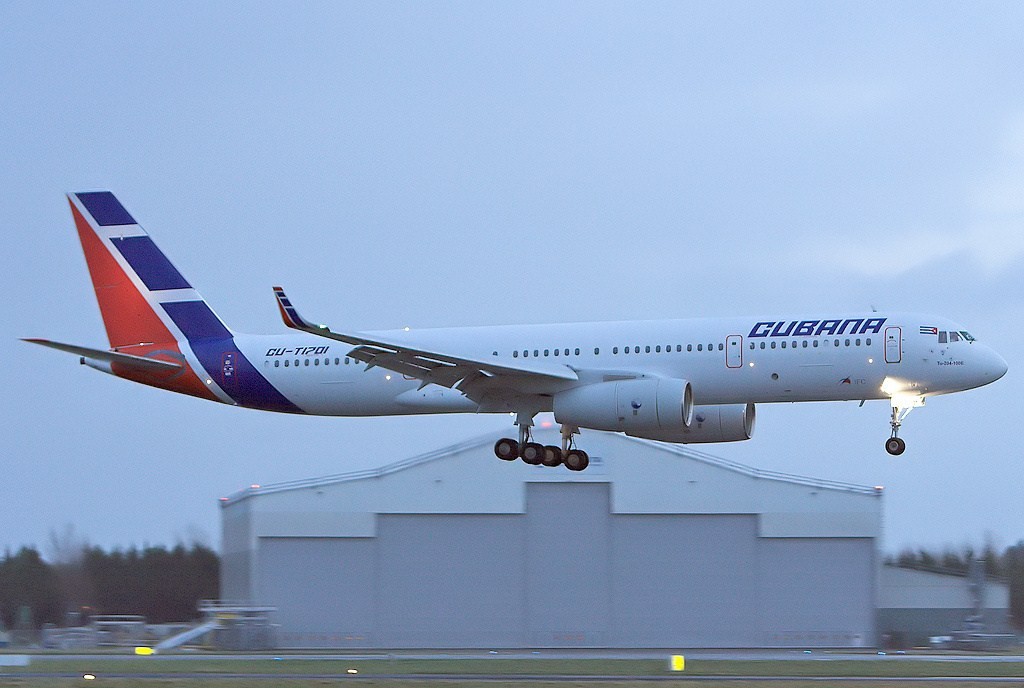President Trump Can Help Offset Import Tariffs By Canada, Mexico, EU & China
Binary & Ternary Strategies
He’d Likely Support It If He Knew About It
Good, Strong Decision
U.S. Food/Ag Exports To Canada Increased 2.2% In 2018
U.S. Food/Ag Exports To Mexico Decreased 3.5% In 2018
U.S. Food/Ag Exports To The EU Increased 9.3% In 2018
U.S. Food/Ag Exports To China Decreased 15.2% In 2018
U.S. Food/Ag Exports To Cuba Increased 20.8% In 2018
In 2018, Cuba Imported More Food/Ag Products From U.S. Than 20 Of 28 EU Members
One OFAC License Could Increase Exports; Secretary Mnuchin Can Authorize It
Home BancShares In Arkansas Has 50% Of The License
Removing Foreign Banks From Transactions Can Increase U.S. Exports
Direct Banking Can Save Exporters 2%+ From Each Payment
Where’s Arkansas’s Republican Governor & All-Republican Congressional Delegation?
To some, The Honorable Donald J. Trump, President of United States, views trade as binary, having two parts- a winner and a loser. Perhaps, it’s more ternary, having three parts- a winner, a loser and a component that equates to fairness.
He believes in overtly rewarding good behavior and overtly punishing bad behavior. He believes in good (strong) deals and not bad (poor) deals. He believes in high risk, high reward strategies. All binary. He espouses and did so during the decades prior to his presidency that trade should be “fair” and the United States should be “treated fairly” and not “treated badly” or “treated poorly.”
President Trump can appreciate the absurdity where a bank located in Canada, Mexico, Panama or the EU receives a fee from a transaction between a farmer, cooperative or company in the United States and the Republic of Cuba.
Thus far in 2018, according to the United States Department of Commerce, the Republic of Cuba has purchased, in U.S. Dollar value, more agricultural commodities and food products from the United States, on a cash-in-advance basis as required by U.S. law, than have twenty (20) of the twenty-eight (28) members of the European Union (EU).
Putting this another way, the Republic of Cuba has thus far in 2018 purchased more agricultural commodities and food products than has 71% of the members of the EU.
The Republic of Cuba’s 20.8% increase in agricultural commodity and food product purchases from the United States thus far in 2018 is also a higher percentage increase than twenty (20) of the twenty-eight (28) members of the EU.
President Trump does not consider the government of the Republic of Cuba to be good, a friend. To him, the government of the Republic of Cuba is a bad actor, a disruptor, deserving to be punished until it changes its behavior voluntarily or through coercion. He has stated he is a friend (“loves”) to the 11.3 million citizens of the 800-mile long archipelago, whose closest point is approximately one hundred (100) miles from the United States; he separates those who lead from those who are led, as have his predecessors.
How does the President maintain punishment, remain tough, strong, be a winner, show love, embrace a good deal, accept high risk… and balance (or re-balance) the interests of politically and economically significant constituencies in those among the fifty states where agricultural exports and food product exports are first without equal?
The President’s position is tariffs are necessary to correct macro-imbalances in bilateral and multilateral trade agreements; and that short-term to medium-term micro-impact upon certain constituencies in certain states may be required to create a far better long-term.
He’s asking those who support him to trust him by accepting pain from his decisions; to those who oppose him, they will come around once he has secured victory. “Make America Great Again” is not without pain- perceived or real. There is a means to mitigate that pain.
For the Republic of Cuba to have a role in providing that victory, that “againness,” President Trump needs to permit one United States bank in Arkansas to obtain a portion of a license it does not have from the United States Department of the Treasury.
One signature from The Honorable Steven Mnuchin, United States Secretary of the Treasury or Ms. Andrea Gacki, Acting Director of the Office of Foreign Assets Control (OFAC) of the United States Department of the Treasury makes it happen,
That license would immediately benefit United States agricultural commodity and food product exporters from the first transaction- United States exporters will get paid safer, faster and with less cost for each payment they receive from the Republic of Cuba. And, ports in Alabama, Florida, Georgia, Louisiana, Mississippi, Texas and Virginia would benefit.
President Trump appreciates that straight line transactions are generally good; triangular transactions are generally bad. He appreciates spending less and receiving more.
That’s a view also appreciated by The Honorable Lawrence Kudlow, Director of the National Economic Council at The White House and his colleague The Honorable Peter Navarro, Director of the National Trade Council at The White House. For both gentlemen, exports matter.
On 31 May 2018, President Trump announced that the United States was “taking action to protect America’s national security from the effects of global oversupply of steel and aluminum. Following extensive discussions and a months-long process, the President will implement tariffs on steel and aluminum imports from Canada, Mexico, and the European Union.”
Following the announcement, the governments of Canada, Mexico and twenty-eight members of the EU reported that tariffs on products, including agricultural commodities and food products, from the United States would be implemented.
On 4 May 2018, President Trump was quoted as saying: “My people are coming back right now from China, and we will be doing something, one way or the other, with respect to what's happening in China. And let me say this: I have great respect for President Xi. That's why we're being so nice. And we have a great relationship. But we must bring fairness into trade between the U.S. and China. And we'll do it.”
On 5 May 2018, The Wall Street Journal reported that exports of soybeans and corn from the United States to the People’s Republic of China had substantially decreased. According to The Honorable Charles Grassley (R- Iowa), a member of the United States Senate, “If [the Chinese] market closes, it could be devastating for local communities across the Midwest.”
Increasing the export of soybeans and corn, and other agricultural commodities and food products from the United States to the Republic of Cuba would not be a panacea, but could materially offset without risk to United States taxpayers because United States law requires payment of cash-in-advance for deliveries of agricultural commodities and food products from the United States to the Republic of Cuba. The law does not need to be altered for exports to increase.
President Trump could take immense satisfaction from using rational commercial logic to correct simple commercial arithmetic that escaped comprehension of the Obama Administration: When export opportunities exist, assist and do no harm. And, if there are two parts to create success, don’t authorize one part and then self-congratulate for not authorizing the other part. President Trump would certainly concur that’s a terrible deal.
Since December 2001, when the first deliveries from the United States to the Republic of Cuba commenced under provisions of the Trade Sanctions Reform and Export Enhancement Act (TSREEA) of 2000, the Republic of Cuba has purchased, on a cash-in-advance basis, more than US$5.6 billion in agricultural commodities and food products from United States companies.
In 2017, the Republic of Cuba ranked 53rd amongst 229 agricultural commodity and food export markets for United States companies according to the United States Department of Commerce; ahead of Poland, Jordan, Argentina, Russia, Qatar and Greece and ahead of twenty (20) of the twenty-eight (28) members of the EU among others.
During the last seventeen (17) years, the Republic of Cuba has purchased approximately US$1.4 billion in soybean products: more than US$621 million in soybeans, more than US$531 million in soybean oil cake, and more than US$245 million in soybean oil.
Thus far in 2018, the Republic of Cuba has purchased approximately US$15 million in soybeans and soybean oil, compared with US$8,493,537.00 (soybeans; no soybean oil) during the same period in 2017. That is a 76.6% increase.
Soybean products represent approximately 25% of all agricultural commodities and food products exported from the United States to the Republic of Cuba since December 2001.
During the last seventeen (17) years, the Republic of Cuba has purchased approximately US$1.15 billion in corn.
Thus far in 2018, the Republic of Cuba has purchased approximately US$9.4 million in corn, compared with US$14,462,001.00 during the same period in 2017. That is a 53.8% decrease.
Corn represents approximately 20% of all agricultural commodities and food products exported from the United States to the Republic of Cuba since December 2001.
To assist towards increasing agricultural commodity and food product exports, along with other authorized exports (agricultural machinery, farm implements, and medical equipment, for example), Conway, Arkansas-based Home BancShares (2018 assets approximately US$14 billion), who through its Centennial Bank subsidiary purchased Pompano Beach, Florida-based Stonegate Bank in September 2017, must augment its existing license from the OFAC. Home BancShares has experience with agriculturally-focused transactions on behalf of its customers in Arkansas, Alabama, Florida and New York.
Mr. C. Randall Sims, President and Chief Executive Officer of Home BancShares, along with Mr. John W. Allison, Chairman of Home BancShares, should seek assistance from their Governor (who visited the Republic of Cuba in 2015) and their Members of Congress:
The Honorable Asa Hutchinson (R), Governor of the State of Arkansas; United States Senators: The Honorable John Boozman (R) and The Honorable Tom Cotton (R); and the four members of the United States House of Representatives: The Honorable Eric “Rick” Crawford (R) who has visited the Republic of Cuba, The Honorable French Hill (R), The Honorable Steve Womack (R), and The Honorable Bruce Westerman (R).
In 2015, the OFAC authorized Stonegate Bank (2017 assets approximately US$2.9 billion) to have an account with Republic of Cuba government-operated Banco Internacional de Comercia SA (BICSA).
However, because the Obama Administration would not authorize BICSA under a general OFAC license or in the OFAC license issued to Stonegate Bank, United States export-related funds have been sent and received through Panama City, Panama-based Multibank, which has extensive dealings with the Republic of Cuba.
Without bilateral direct correspondent banking accounts, the payment process for funds from the United States to the Republic of Cuba and from the Republic of Cuba to the United States remains triangular rather than a straight line- which would be more efficient, more secure, more transparent, more timely (same day versus two or more days), and less costly.
The augmentation of the OFAC license would be consistent with the export-focused mandates of the United States Department of Agriculture (USDA) and United States Department of Commerce (DOC) by the Trump Administration.
Previously, officials within the OFAC and United States Department of State shared that if a license application were submitted, the license application would likely be approved.
OFAC Regulations:
55. Are financial institutions other than banks permitted to open correspondent accounts in Cuba? Depository institutions, as defined in 31 CFR §515.333, which include certain financial institutions other than banks, are permitted to open correspondent accounts at banks in Cuba. See 31 CFR §515.584(a).
(f) Any banking institution, as defined in §515.314, that is a person subject to U.S. jurisdiction is authorized to provide financing for exports or reexports of items, other than agricultural commodities, authorized pursuant to §515.533, including issuing, advising, negotiating, paying, or confirming letters of credit (including letters of credit issued by a financial institution that is a national of Cuba), accepting collateral for issuing or confirming letters of credit, and processing documentary collections. With the exception of transactions related to exports or reexports of medicines or medical supplies, items associated with the provision of telecommunications and internet services for the Cuban people, or items associated with air and sea operations that support permissible travel, cargo, or trade, nothing in this paragraph authorizes a direct financial transaction prohibited by §515.209.
56. Are Cuban banks permitted to open correspondent accounts at U.S. banks? No. U.S. depository institutions are permitted to open correspondent accounts at Cuban banks located in Cuba and in third countries, and at foreign banks located in Cuba, but Cuban banks are not generally licensed to open such accounts at U.S. banks. See note to 31 CFR §515.584(a).
What To Do?
Home BancShares should seek the 50% of its correspondent banking license from the OFAC that it does not possess to then transparently, securely, and efficiently receive funds from the Republic of Cuba and transfer funds to the Republic of Cuba.
A fully-implemented direct correspondent banking agreement will lessen transaction costs by up to 2% or more; and that 2% could result in additional soybean products and corn and other agricultural commodities and food products exported from the United States to the Republic of Cuba.
Since December 2001, the Republic of Cuba has transferred more than US$5.6 billion to United States-based companies for the purchase of agricultural commodities, food products and healthcare products (medical instruments, medical equipment, medical supplies and pharmaceuticals); approximately US$150 million went to third-country financial institutions to process those payments.
Additional effort. Additional time. Additional expense. And, additional reasons for the government of the Republic of Cuba to avoid United States-based companies.
The government of the Republic of Cuba may believe, and not without some reasonableness, that if the OFAC does not want United States companies to save on transaction fees and gain from the potential savings in terms of increased product exports, then so be it. And, providing additional revenues to banks located in Canada, Mexico and the EU creates goodwill for the Republic of Cuba.
The government of the Republic of Cuba has a responsibility to gain as much as possible from each bilateral commercial relationship; and United States companies can provide high quality product, with competitive pricing, on a consistent basis, through efficient ground and rail and port transportation networks. That’s a benefit to the 11.3 million citizens of the 800-mile long archipelago.
United States companies (large, medium and small; and individual farmers) who engage in authorized transactions with any country should not be financially penalized by the United States government.
There exists an available OFAC licensing pathway to solve a payment problem. Home BancShares and BICSA should make use of it. The USDA and DOC should support it.
It’s the type of good deal for the United States that President Trump looks to support… he just needs to know about it.
Link To Complete Analysis In PDF Format
Link To Previous Blog Post:
https://www.cubatrade.org/blog/2017/12/12/president-trump-deserves-opportunity-to-right-an-obama-administration-wrong-sftcp-dcb?rq=Stonegate%20Bank


























